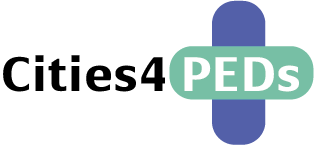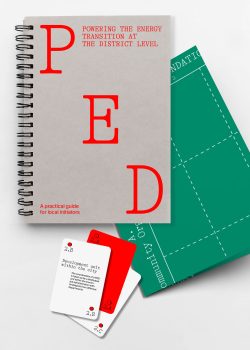Cities4PEDs
Exploring city levers to enable Positive Energy Districts (PEDs) across diverging contexts

Positive Energy Districts Toolkit
After two years of researching, experimenting, and gaining knowledge on Positive Energy Districts (PEDs), we are finalising the Cities4PEDs project. We pass on the lessons learned to PEDs in the making and new generations of PEDs through a toolkit: ‘Powering the energy transition at the district level, A practical guide for local initiators’.

What will you find in the toolkit?
How do you initiate and guide a Positive Energy District (PED)? With whom do you build the district strategy, when and where do you start? How do you connect to neighbourhood dynamics? Which city instruments can help you to implement a PED? What are your targets and how do you assess whether or not you are reaching them? These are some of the operational questions faced by those leading the implementation of a PED. This practical toolkit focuses on hands-on strategies, processes, and transformational capacities, to support and inspire local PED initiators.
‘Powering the energy transition at the district level, A practical guide for local initiators’ is a toolkit consisting of a handbook and a game of playing cards. It collects operational questions, tools, and considerations from real urban districts in Europe. The experiences from Brussels, Stockholm and Vienna and interviews with many other European cases within the Cities4PEDs research trajectory form the backbone of this toolkit. It aims to inspire ambitious initiators, governments, and coalitions of stakeholders in setting up their own PEDs.
The handbook is divided into three main parts:
- Framing PEDs and exemplary portraits
The term Positive Energy District (PED) is a relatively new concept. This chapter outlines the relevant dimensions that make up a PED from a practical point of view. We illustrate these aspects through the narratives of six sample neighbourhoods that are working towards becoming PEDs: The Brussels Northern District (BE), Aspern Seestadt in Vienna (AT), the Stockholm Royal Seaport (SE), Lyon Confluence (FR), Bospolder-Tussendijken in Rotterdam (NL) and the Georgian District in Limerick (IR)
- Keys for PED (re)development
We then look at 11 questions that PED initiators ask themselves. How do you analyse the local context? How to coordinate the (re)development of the district? How to involve local stakeholders? How to set the right goal? How to structure a step-by-step process? How to finance it? What projects to set up? How to develop local capacity? What city instruments are available? How to monitor and evaluate the process? How to create an enabling environment? We cannot answer all these questions. However, the guide provides a number of inspiring directions, illustrated with examples from concrete cases, which are written so that you can start applying them yourself
- Considerations
There are tensions in each of these strategies. Is it mostly important to meet the energy target, or should we at the same time invest in a sustainable community? How important is it that current residents can stay in the neighbourhood? Does it make more sense to renovate buildings and public spaces in phases, or do you opt for the more expensive, deeper transformation all at once? The considerations in this chapter are designed to stimulate discussion and challenge you to reflect on the value frameworks and assumptions you take for granted.
Next to a handbook, this toolkit offers supporting elements to stimulate local conversations and accelerate collaboration on your own PED development. The toolkit includes a set of playing cards that summarise building blocks, actions, and considerations, which help you in setting up your own local workshops with colleagues and stakeholders.
Are you a local initiator? Are you working on a district strategy for PED implementation? Are you building and activating local coalitions and ready to connect with the neighbourhood dynamics? Join our process of testing, learning and accelerating new practices for PED (re)development.


